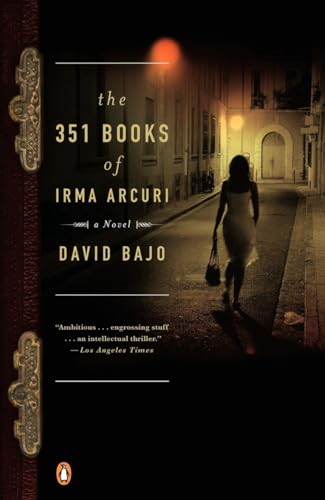Items related to The 351 Books of Irma Arcuri: A Novel

"synopsis" may belong to another edition of this title.
He stopped driving the Franklin Bridge and started riding the ferry after his second ex-wife won both cars in their friendly settlement. Letting Beatrice have both cars was not as amicable as it may have seemed to her and her lawyer. In the 30 seconds it took her attorney to utter the request, Philip accurately calculated the economic and temporal impacts of parking two cars in downtown Philadelphia.
He accepted. He had a certain way of seeing things—a tilt—and so he trusted her and her anger toward him. She took ownership of their flat near Rittenhouse Square. She compensated him for this, but in terms of what the place was worth when they bought it together, not in the inflated terms it was worth now.
After the ferry took him to Camden, he went to work just long enough to resign and then walked along the riverfront to the aquarium. He spent the day there, learning that the glass separating him from the fish was 11 inches thick. He waited until 11 to call the Arcuris, so that it would not be too early an hour on the West Coast. He called them from the aquarium's promenade.
Mrs. Arcuri answered on the third ring. She answered 97% of the time, so Philip was expecting her voice. He asked her about the bequeathment and didn't that imply some kind of death or vanishing. He listened to Irma's mother for five minutes before his cell phone was cut off, the interruption informing him that the insurance company he quit earlier had removed him from their service. He understood their anger and was relieved by the abrupt ending it gave to his conversation with Mrs. Arcuri. She stopped liking him twenty years ago when she realized that he was not going to marry her daughter. She remained polite, treating him through the years as a sort of family member, one known as the man who would not marry our daughter. Whenever he had Thanksgiving with the Arcuris, he was seated next to whomever was Irma's current lover, like the next figure down on her mother's evolutionary scale of suitors.
Irma, he learned from Mrs. Arcuri's abbreviated chat, was only figuratively dead. If she had actually died, Mrs. Arcuri assured him, she would have called him in person. But he could tell by the erosion in her voice—her verb to total word ratio diminishing from sentence to sentence—that this figurative death was almost as distressing and final as a literal death. Irma was gone. Her figurative suicide note, left on a pillow in a pensión in Seville, mentioned a secular mission, the sacrifice of one's dreams. Most tragically, it declared an end to her writing. Mrs. Arcuri cried during this sentence. The cell phone cut-off occurred amid her tears.
Philip wandered back into the dark knot of the aquarium, to the jellyfish display, where he watched one small tank for a long time. The jellies were only a few centimeters long, but they were colorful and phosphorescent in their black water. They were from the deep sea trenches off The Philippines.
The jellyfish took turns undulating themselves upward, then parachuting softly through the dark water. This is how they gathered microscopic food, Philip read from the descriptive plaque. Some lit up like neon, others were hardly visible, membranes in ink. At the bottom of the plaque, Philip saw that his insurance firm—his now ex-insurance firm—sponsored the jellyfish. He briefly calculated the cost of this sponsorship: the ichthyologists, their collecting grants, the specialized boat and equipment, permission from The Philippines, tank maintenance. All for a few centimeters of sea-life, wisps of vellum that were barely even there. The plaque understated the firm's generosity.
His resignation had not been bold. The cell phone cut-off aside, he was reasonably certain they would take him back; his talent was rare enough. Depending on whose research you followed, there were approximately 10,000 to 25,000 like him in the world. Perhaps a thousand of those lived in America. Of those thousand, only a few hundred had their talent discovered because they were in ideal socioeconomic situations, fewer had taken the time and effort to cultivate it through higher education, and roughly a third of those were of working age. He knew numbers. Others called it calculation, but usually there was no calculation necessary, certainly not in the simple math of addition, subtraction, multiplication, division, square roots, and exponents. If you gave him a set of numbers and told him what to do with them—add them, cube the result and then give the square root, for example—he could do it in his head in the time it took you to input.
"About this title" may belong to another edition of this title.
- PublisherPenguin Books
- Publication date2009
- ISBN 10 0143115405
- ISBN 13 9780143115403
- BindingPaperback
- Number of pages304
- Rating
Buy New
Learn more about this copy
Shipping:
FREE
Within U.S.A.
Top Search Results from the AbeBooks Marketplace
The 351 Books of Irma Arcuri: A Novel
Book Description Condition: New. New! This book is in the same immaculate condition as when it was published. Seller Inventory # 353-0143115405-new
The 351 Books of Irma Arcuri: A Novel
Book Description Paperback. Condition: New. Reprint. Seller Inventory # DADAX0143115405
The 351 Books of Irma Arcuri: A Novel
Book Description Paperback. Condition: Brand New. reprint edition. 304 pages. 8.75x5.75x0.75 inches. In Stock. Seller Inventory # 0143115405
THE 351 BOOKS OF IRMA ARCURI: A
Book Description Condition: New. New. In shrink wrap. Looks like an interesting title! 0.53. Seller Inventory # Q-0143115405

